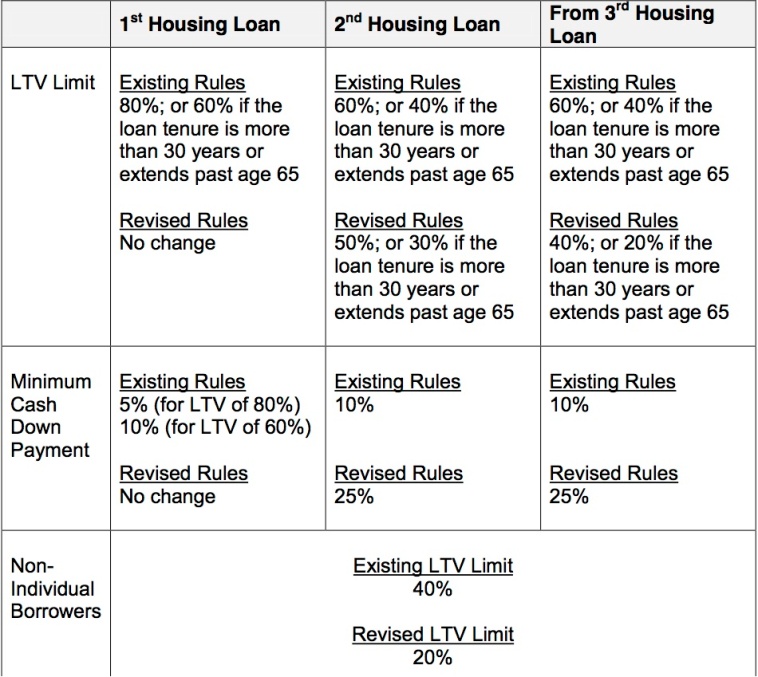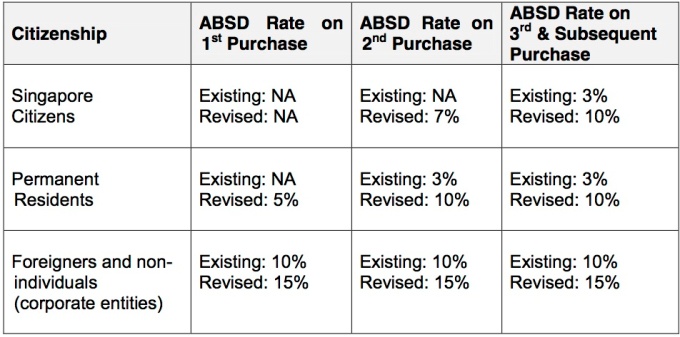The Government announced today a comprehensive package of measures to cool the residential property market. It also introduced a Seller’s Stamp Duty on industrial properties for the first time, to discourage speculative activity in the industrial market.
Cooling Measures for the Residential Property Market
The Government has implemented several rounds of measures to cool demand and expand supply, so as to moderate the increase in housing prices. While these measures have dampened speculative buying, the demand for residential property remains firm and prices have continued to rise.
 The
continued buoyancy of the property market reflects the very low
interest rate environment and continued income growth in Singapore.
These factors supported a record level of housing transactions last
year, particularly from investment demand. Housing prices have also
shown signs of reaccelerating in recent months, in both the private
residential and HDB resale flat markets. Price increases, if not
checked, will run further ahead of economic fundamentals and raise the
risk of a major, destabilising correction later on.
The
continued buoyancy of the property market reflects the very low
interest rate environment and continued income growth in Singapore.
These factors supported a record level of housing transactions last
year, particularly from investment demand. Housing prices have also
shown signs of reaccelerating in recent months, in both the private
residential and HDB resale flat markets. Price increases, if not
checked, will run further ahead of economic fundamentals and raise the
risk of a major, destabilising correction later on.
The Government has therefore decided to implement a further set of measures to cool the private and public housing markets. These measures are calibrated to be tighter on property ownership for investment, as well as on foreign buyers. To discourage over-borrowing, financing conditions for housing have also been tightened. In addition, structural measures have been implemented to strengthen the policy intent of public housing and Executive Condominiums (ECs).
Deputy Prime Minister and Minister for Finance Mr Tharman Shanmugaratnam said: “The reality we face is that interest rates are extraordinarily low, globally and in Singapore, and continue to add fuel to our property market. We have to take this further round of measures now, to check recent market trends and avoid a more serious correction in prices further down the road.”
Minister for National Development Mr Khaw Boon Wan said: “A large supply of public and private housing – up to 200,000 units in total – will be completed in the coming years. Coupled with the new measures, we will be better placed to ensure that housing remains affordable to Singaporeans.”
Measures Applicable to all Residential Property
The following measures will take effect on 12 January 2013:
a) Additional Buyer’s Stamp Duty (ABSD) rates will be:
i) Raised between five and seven percentage points across the board.
ii) Imposed on Permanent Residents (PRs) purchasing their first residential property and on Singaporeans purchasing their second residential property.
b) Loan-to-Value limits on housing loans granted by financial institutions will be tightened for individuals who already have at least one outstanding loan, as well as to non-individuals such as companies.
c) Besides tighter Loan-to-Value limits, the minimum cash down payment for individuals applying for a second or subsequent housing loan will also be raised from 10% to 25%.
 The
measures listed above will not impact most Singaporeans buying their
first home. Some concessions will also be extended to selected groups of
buyers, such as married couples with at least one Singaporean spouse
who are purchasing their second property and will sell their first
residential property.
The
measures listed above will not impact most Singaporeans buying their
first home. Some concessions will also be extended to selected groups of
buyers, such as married couples with at least one Singaporean spouse
who are purchasing their second property and will sell their first
residential property.
The new ABSD and loan rules are significant, but they are temporary. They are being imposed to cool the market now, and will be reviewed in the future depending on market conditions.
Measures Specific to Public Housing
The Government is also introducing measures to further moderate the demand for HDB flats, instil greater financial prudence among buyers, and require owner occupation by PR buyers. The following measures will take effect on 12 January 2013:
a) Tighter eligibility for loans to buy HDB flats:
i) MAS will cap the Mortgage Servicing Ratio (MSR) for housing loans granted by financial institutions at 30% of a borrower’s gross monthly income.
ii) For loans granted by HDB, the cap on the MSR will be lowered from 40% to 35%.
b) PRs who own a HDB flat will be disallowed from subletting their whole flat.
c) PRs who own a HDB flat must sell their flat within six months of purchasing a private residential property in Singapore.
An additional measure will take effect on 1 July 2013 to tighten the terms for granting HDB loans and the use of CPF funds for the purchase of HDB flats with remaining leases of less than 60 years (details of this measure are in Annex IV).
Measures for Executive Condominium Developments
The Government will introduce measures specific to new EC developments to ensure that ECs continue to serve as an affordable housing option for middle-income Singaporean families.
The following measures will take effect on 12 January 2013:
a) The maximum strata floor area of new EC units will be capped at 160 square metres.
b) Sales of new dual-key EC units will be restricted to multi-generational families only.
c) Developers of future EC sale sites from the Government Land Sales programme will only be allowed to launch units for sale 15 months from the date of award of the sites or after the physical completion of foundation works, whichever is earlier.
d) Private enclosed spaces and private roof terraces will be treated as gross floor area (GFA). The GFA of such spaces in non-landed residential developments, including ECs, will be counted as part of the ‘bonus’ GFA of a residential development and subject to payment of charges. This is in line with the treatment of balconies under URA’s current guidelines. Details of this measure are athttp://www.ura.gov.sg/circulars/text/dc13-01.htm.
Cooling Measure for the Industrial Property Market: Seller’s Stamp Duty
Prices of industrial properties have doubled over the last three years, outpacing the increase in rentals. In addition, there has been increasing speculation in industrial properties: in 2011 and the first eleven months of 2012, about 15% and 18% respectively of all transactions of multiple-user factory space were resale transactions carried out within three years of purchase. This is significantly higher than the average of about 10% from 2006 to 2010.
The Government is introducing Seller’s Stamp Duty (SSD) on industrial property to discourage short-term speculative activity which could distort the underlying prices of industrial properties and raise costs for businesses.
With effect from 12 January 2013, the following SSD rates will be imposed on industrial properties and land bought and sold within three years of the date of purchase:
a) SSD at 15% if the property is sold in the first year of purchase, i.e. the property is held for one year or less from the date of purchase.
b) SSD at 10% if the property is sold in the second year of purchase, i.e. the property is held for more than one year and up to two years from the date of purchase.
c) SSD at 5% if the property is sold in the third year of purchase, i.e. the property is held for more than two years and up to three years from the date of purchase.
The Inland Revenue Authority of Singapore (IRAS) will be releasing an E-tax guide on the circumstances under which SSD is applicable and the procedures for paying SSD. The E-tax guide will be available at http://www.iras.gov.sg.
Issued by the Ministry of Finance, Ministry of National Development, Monetary Authority of Singapore and Ministry of Trade & Industry




